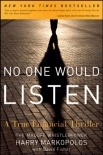No One Would Listen: A True Financial Thriller, Harry Markopolos [graded readers .TXT] 📗

- Author: Harry Markopolos
Book online «No One Would Listen: A True Financial Thriller, Harry Markopolos [graded readers .TXT] 📗». Author Harry Markopolos
Neil was obviously smart, but even as an intern, he was headstrong and opinionated. If he disagreed with something I said, he would not hesitate to let me know quickly and forcefully. And like a pit bull, once he got his teeth into an argument he wouldn’t let it go. Now, I had spent 17 years in the military. Among the lessons I had learned was that you can raise an objection once, maybe twice; but once a command decision was made, you didn’t continue to question it. Neil hadn’t learned that lesson, so when he believed he was right he wouldn’t let go. But these weren’t frivolous arguments; he knew his stuff. That’s what made him so valuable when we began to analyze Madoff’s numbers.
Math came naturally to Neil. Like me, maybe even more than me, he could glance at numbers and draw meaningful conclusions from them. At Bentley College, he played a lot of poker, ran a small bookie operation, and came to believe firmly in the efficient markets hypothesis. Believing that concept was where Neil and I differed most. The efficient markets hypothesis, which was first suggested by French mathematician Louis Bachelier in 1900 and was applied to the modern financial markets by Professor Eugene Fama at the University of Chicago in 1965, claims that if all information is simultaneously and freely available to everyone in the market, no one can have an edge. In this hypothesis having an edge means that for all intents and purposes you have accurate information that your competitors don’t have. It basically means that you can’t beat the market, that there is no free lunch.
After the first few weeks, Neil and I began going out to lunch together, to a local Greek place, naturally. The most important thing I taught Neil that summer was that what he learned in the office was not going to determine his success in this business. The only possible way of gaining an edge in the financial industry is by gathering information that others don’t have. There are so many smart people in this business that it’s impossible to outsmart them, so you simply have to have more and better information than they do. Information on a database that can be purchased is available to everyone; there’s no advantage to having it, but the knowledge that one day might make a difference is best obtained from others in simple conversations. It’s stuff you can’t buy from a database provider; you have to learn it one relationship at a time. In the army we called it human intelligence gathering.
I had established the one-third rule: For every three hours you spend at work you have to spend at least one hour outside the office on professional development. That might mean reading material that might improve your life, but more likely it meant—just as I had learned at Darien Capital—social networking. I encouraged Neil to take advantage of the pub culture in Boston, to go to professional association meetings, and to go to dinners. As I explained to him, that’s where the information that one day may make the difference is learned. That’s where you find out what other firms are doing to be successful and where they are failing, what their problems are, and how they’re dealing with them. For example, in those social conversations you hear about the idiosyncrasies of different traders, so when you see them making a move you know how to properly interpret it. I taught him that it is important to know everything that’s going on in your field, in your industry, and in your sector in the industry, and that the only real way to do that is going to lunches and dinners and happy hours and meetings and getting there early and staying late. I taught him that ignorance begins where knowledge ends, so to be successful he needed to be a gatherer and a hoarder of information.
These were the tools we depended on throughout our investigation.
When Neil returned to college in the fall of 1992 to earn credit for his work as an intern, he had to write a paper. This will tell you what you need to know about Neil: The paper he wrote criticized the basic investment strategy we used at Rampart because it violated the efficient markets hypothesis.
Three years later, after working in various jobs at several different types of investment companies, Neil returned to Rampart. Initially he was hired to upgrade our accounting system, with the unspoken hope that eventually it might become something more. For several months Neil ran two accounting systems—our legacy system and the new system—in parallel, and reconciled everything to the penny. If he couldn’t get that last penny to balance, he’d work at it until it did. But what he really wanted to do was portfolio management. Eventually our desks were back-to-back; so we sat directly across from each other, separated only by a divider about 18 inches high, for nine hours a day, five days a week. Over several years we got to know each other better than we knew our families. Neil and I were both research geeks who loved the hunt, and we spent considerable time searching for ways to optimally create portfolios that had the highest chance





Comments (0)